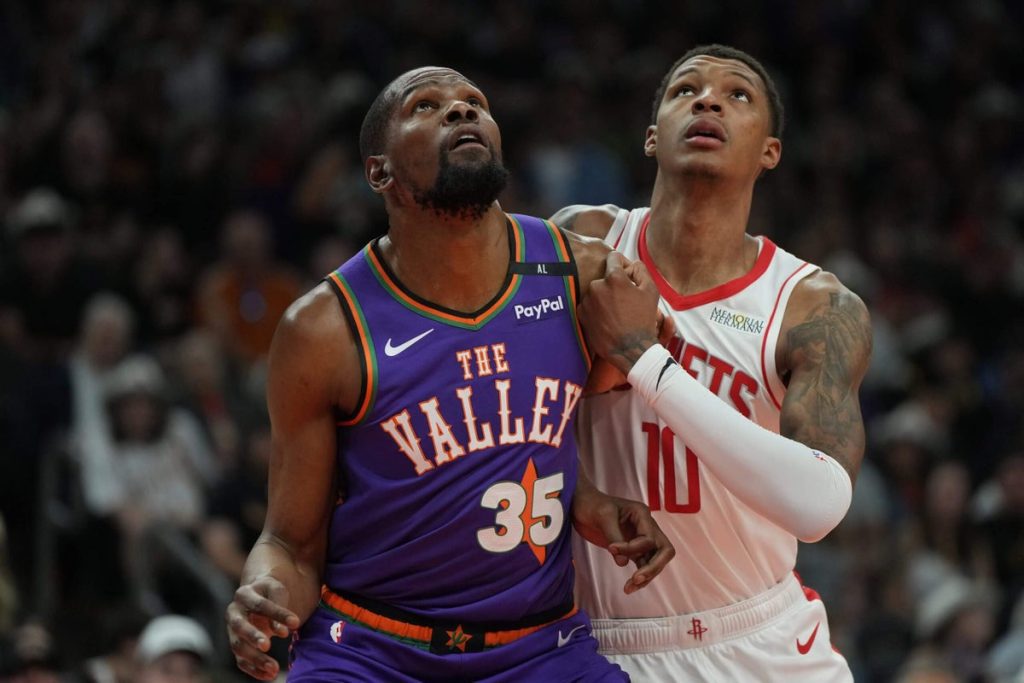While the basketball community focused on Game 7 of the NBA Finals, Kevin Durant was traded for the third time in his career, marking his arrival at his fifth team. His departure from Phoenix was surprisingly smooth as the Suns reportedly agreed to send him to the Houston Rockets in exchange for Jalen Green, Dillon Brooks, this year’s 10th pick, and five second-round picks.
The Athletic’s Sam Amick confirmed the trade through team sources.
ESPN was the first to break the news.
This trade seems hasty, showcasing an inexperienced front office executive negotiating with a savvy counterpart who held significant leverage. However, a deeper analysis may reveal that both teams could benefit from the deal (spoiler: they might not). Let’s evaluate this trade and assign grades:
Rockets Acquire Durant
The Rockets have shown curiosity about how patient they should be with their current roster, as there’s no rush. Following a rise from 41 wins and missing the Play-In Tournament in 2023-24 to becoming the No. 2 seed and experiencing a first-round exit with a young squad last season, the Rockets had choices heading into the offseason. Speculation surrounded whether they would make a significant move at the trade deadline for a playoff push, but they opted to assess their current core. That core consists of a talented, youthful, defense-oriented team needing offensive firepower.
Durant’s Impact
As the week unfolds, Durant, previously eyed by them at the trade deadline, is now a Rocket. Even as he approaches 37 and has dealt with injuries since his Achilles’ tendon injury in 2019, he remains one of the league’s most difficult players to defend. In his 15th season as an All-Star, he averaged 26.6 points, 6.0 rebounds, and 4.2 assists with impressive shooting splits. Though he missed 20 games, the Suns had a 33-29 record with him versus a dismal 3-17 without him.
Building Around Durant
Adding Durant to a core that includes Alperen Şengün, Jabari Smith Jr., Amen Thompson, Tari Eason, and Fred VanVleet (if they sort out his contract) sets a strong foundation for building on their previous season. The Rockets, with 52 wins, shouldn’t overexert Durant during the regular season. His role will primarily be to enhance the team’s performance rather than save it. The Rockets are confident they can achieve 50 wins through strong defense and a tough playing style. The question remains, how will replacing the inconsistent Green with Durant change their dynamic?
Suns’ Loss
On the flip side, the Suns’ new and inexperienced front office, led by general manager Brian Gregory, appears to have faltered in this trade. The goals for the Suns should have included reclaiming picks, acquiring Eason, achieving cap relief, adding veterans for competitiveness, and ensuring a reliable big man. Unfortunately, they fell short in most areas and may struggle to integrate Green effectively alongside Devin Booker and Bradley Beal.
Future Outlook
The Suns need to avoid tanking, especially since the Rockets hold many of their picks. Potentially flipping Brooks could be an option, but his ability to significantly transform the team remains uncertain. The 10th pick does provide a chance to select a promising player, but it may not result in immediate success. The five second-round picks alone won’t elevate this trade into a favorable one. Only if they nail the 10th pick or trade a notable guard for better assets could this deal salvage itself.
Conclusion
The Suns aimed to finalize a deal before the draft but likely didn’t secure the best available option for their team’s future.
Grade: D



